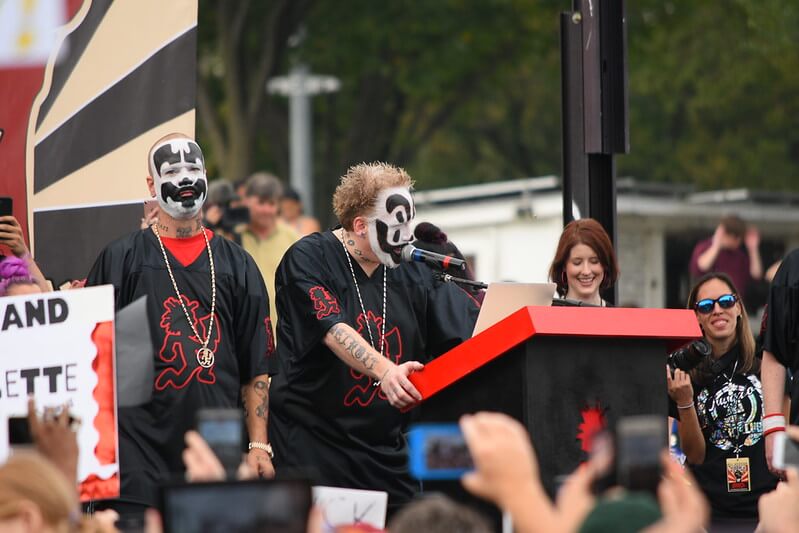(SQAUK) – In 2011, the FBI’s National Gang Intelligence Center issued its National Gang Threat Assessment, which controversially classified the Juggalos—fans of the hip-hop group Insane Clown Posse—as a “loosely organized hybrid gang.” This decision was met with widespread criticism and concern, particularly from the Juggalos themselves, who felt unfairly stigmatized by the label.
The classification stemmed from isolated incidents involving individuals who identified as Juggalos, leading to the group being associated with criminal activity. However, many argued that the actions of a few should not define the entire fanbase, primarily known for its communal support and love of music.
The Insane Clown Posse and the American Civil Liberties Union (ACLU) filed a lawsuit against the FBI and the Department of Justice, seeking to clear their name and protect their fans from unwarranted scrutiny. They contended that the gang label was not only inaccurate but also had profound implications for the civil liberties of Juggalos, affecting their employment, housing, and personal lives.
The legal battle emphasized the broader implications of such a designation by law enforcement and the potential infringement on freedom of expression and association. It raised important questions about the criteria authorities use to classify groups as gangs and the need for transparency and accountability in these decisions.
The Juggalos and the FBI case is a significant chapter in the ongoing discourse about individual rights, law enforcement overreach, and the power of labels in shaping public perception and policy.
The Insane Clown Posse (ICP), a hip-hop duo known for their elaborate performances and dedicated fan base called Juggalos, found themselves in an unexpected battle with the FBI. The controversy began when the FBI’s 2011 National Gang Threat Assessment report labeled the Juggalos as a “loosely organized hybrid gang.” This classification had severe repercussions for the group’s fans, leading to instances of discrimination and legal challenges.
The ICP, comprising Joseph Bruce (Violent J) and Joseph Utsler (Shaggy 2 Dope), along with the American Civil Liberties Union (ACLU), filed a lawsuit against the FBI and the Department of Justice. They argued that the gang designation was unwarranted and violated their First Amendment rights, causing harm to their fans. Some Juggalos reported losing their jobs, being evicted from their homes, or being dismissed from the military due to the classification.
(Ad) Get the new book Hidden Axis: Forces Beyond the Visible World – Uncover the secrets they don’t want you to know. Dive into the truth about cosmic forces, government conspiracies, and humanity’s future.
The legal battle has evolved over the years. At one point, a federal appeals court ruled in favor of the ICP, allowing their lawsuit to proceed after a district court had dismissed it. The court’s decision acknowledged the potential harm caused by the gang label and granted the ICP the opportunity to challenge the FBI’s designation.
The case highlighted the broader issue of how law enforcement agencies perceive and treat music fans. It raised questions about the freedom of expression and the potential consequences of government agencies’ classifications on individuals’ lives.
The ICP’s fight against the FBI’s classification is not just about a band and its fans; it’s a reflection of the ongoing struggle for civil liberties and the right to express oneself without fear of unjust repercussions. The outcome of this legal battle could set a precedent for how similar cases are handled in the future and serve as a reminder of the importance of vigilance in protecting individual rights.


